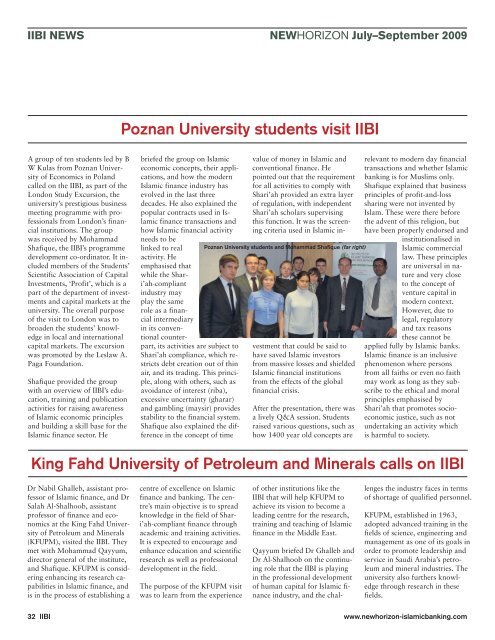issue no. 172 - july–september 2009 / rajab–ramadan 1430
issue no. 172 - july–september 2009 / rajab–ramadan 1430
issue no. 172 - july–september 2009 / rajab–ramadan 1430
Create successful ePaper yourself
Turn your PDF publications into a flip-book with our unique Google optimized e-Paper software.
IIBI NEWS<br />
NEWHORIZON July–September <strong>2009</strong><br />
Poznan University students visit IIBI<br />
A group of ten students led by B<br />
W Kulas from Poznan University<br />
of Eco<strong>no</strong>mics in Poland<br />
called on the IIBI, as part of the<br />
London Study Excursion, the<br />
university’s prestigious business<br />
meeting programme with professionals<br />
from London’s financial<br />
institutions. The group<br />
was received by Mohammad<br />
Shafique, the IIBI’s programme<br />
development co-ordinator. It included<br />
members of the Students’<br />
Scientific Association of Capital<br />
Investments, ‘Profit’, which is a<br />
part of the department of investments<br />
and capital markets at the<br />
university. The overall purpose<br />
of the visit to London was to<br />
broaden the students’ k<strong>no</strong>wledge<br />
in local and international<br />
capital markets. The excursion<br />
was promoted by the Leslaw A.<br />
Paga Foundation.<br />
Shafique provided the group<br />
with an overview of IIBI’s education,<br />
training and publication<br />
activities for raising awareness<br />
of Islamic eco<strong>no</strong>mic principles<br />
and building a skill base for the<br />
Islamic finance sector. He<br />
briefed the group on Islamic<br />
eco<strong>no</strong>mic concepts, their applications,<br />
and how the modern<br />
Islamic finance industry has<br />
evolved in the last three<br />
decades. He also explained the<br />
popular contracts used in Islamic<br />
finance transactions and<br />
how Islamic financial activity<br />
needs to be<br />
linked to real<br />
activity. He<br />
emphasised that<br />
while the Shari’ah-compliant<br />
industry may<br />
play the same<br />
role as a financial<br />
intermediary<br />
in its conventional<br />
counterpart,<br />
its activities are subject to<br />
Shari’ah compliance, which restricts<br />
debt creation out of thin<br />
air, and its trading. This principle,<br />
along with others, such as<br />
avoidance of interest (riba),<br />
excessive uncertainty (gharar)<br />
and gambling (maysir) provides<br />
stability to the financial system.<br />
Shafique also explained the difference<br />
in the concept of time<br />
Poznan University students and Mohammad Shafique (far right)<br />
value of money in Islamic and<br />
conventional finance. He<br />
pointed out that the requirement<br />
for all activities to comply with<br />
Shari’ah provided an extra layer<br />
of regulation, with independent<br />
Shari’ah scholars supervising<br />
this function. It was the screening<br />
criteria used in Islamic investment<br />
that could be said to<br />
have saved Islamic investors<br />
from massive losses and shielded<br />
Islamic financial institutions<br />
from the effects of the global<br />
financial crisis.<br />
After the presentation, there was<br />
a lively Q&A session. Students<br />
raised various questions, such as<br />
how 1400 year old concepts are<br />
relevant to modern day financial<br />
transactions and whether Islamic<br />
banking is for Muslims only.<br />
Shafique explained that business<br />
principles of profit-and-loss<br />
sharing were <strong>no</strong>t invented by<br />
Islam. These were there before<br />
the advent of this religion, but<br />
have been properly endorsed and<br />
institutionalised in<br />
Islamic commercial<br />
law. These principles<br />
are universal in nature<br />
and very close<br />
to the concept of<br />
venture capital in<br />
modern context.<br />
However, due to<br />
legal, regulatory<br />
and tax reasons<br />
these can<strong>no</strong>t be<br />
applied fully by Islamic banks.<br />
Islamic finance is an inclusive<br />
phe<strong>no</strong>me<strong>no</strong>n where persons<br />
from all faiths or even <strong>no</strong> faith<br />
may work as long as they subscribe<br />
to the ethical and moral<br />
principles emphasised by<br />
Shari’ah that promotes socioeco<strong>no</strong>mic<br />
justice, such as <strong>no</strong>t<br />
undertaking an activity which<br />
is harmful to society.<br />
King Fahd University of Petroleum and Minerals calls on IIBI<br />
Dr Nabil Ghalleb, assistant professor<br />
of Islamic finance, and Dr<br />
Salah Al-Shalhoob, assistant<br />
professor of finance and eco<strong>no</strong>mics<br />
at the King Fahd University<br />
of Petroleum and Minerals<br />
(KFUPM), visited the IIBI. They<br />
met with Mohammad Qayyum,<br />
director general of the institute,<br />
and Shafique. KFUPM is considering<br />
enhancing its research capabilities<br />
in Islamic finance, and<br />
is in the process of establishing a<br />
centre of excellence on Islamic<br />
finance and banking. The centre’s<br />
main objective is to spread<br />
k<strong>no</strong>wledge in the field of Shari’ah-compliant<br />
finance through<br />
academic and training activities.<br />
It is expected to encourage and<br />
enhance education and scientific<br />
research as well as professional<br />
development in the field.<br />
The purpose of the KFUPM visit<br />
was to learn from the experience<br />
of other institutions like the<br />
IIBI that will help KFUPM to<br />
achieve its vision to become a<br />
leading centre for the research,<br />
training and teaching of Islamic<br />
finance in the Middle East.<br />
Qayyum briefed Dr Ghalleb and<br />
Dr Al-Shalhoob on the continuing<br />
role that the IIBI is playing<br />
in the professional development<br />
of human capital for Islamic finance<br />
industry, and the challenges<br />
the industry faces in terms<br />
of shortage of qualified personnel.<br />
KFUPM, established in 1963,<br />
adopted advanced training in the<br />
fields of science, engineering and<br />
management as one of its goals in<br />
order to promote leadership and<br />
service in Saudi Arabia’s petroleum<br />
and mineral industries. The<br />
university also furthers k<strong>no</strong>wledge<br />
through research in these<br />
fields.<br />
32 IIBI www.newhorizon-islamicbanking.com
















